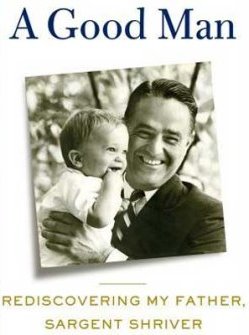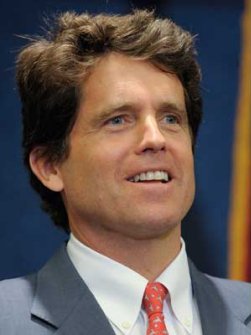Mark Shriver writes a book about his dad, Sargent Shriver, first
director of The Peace Corps and avid letter writer.
Mark Shriver
recently published a memoir about
his father, called A Good Man, [Henry Holt & Company] shortly
after Sargent’s death from Alzheimer’s disease in 2011, at age 95.
Sargent Shriver was the first director of The Peace Corps
and The Jobs Corps, among other organizations that helped people
around the world escape poverty. He was also instrumental in
President Johnson’s War on Poverty during the Sixties, as well as a
driving force behind the Head Start program, which provides
comprehensive education and nutrition to lower-income children.
Mark took his dad’s inspirational lead. He heads up the US
division of Save the Children, which promotes children’s rights,
providing relief and support for children in developing countries.
It’s also easy to see from his looks and from his
commitment to public service that he is a Kennedy. His mother is
Eunice
Kennedy Shriver (President Kennedy’s sister), who died in 2009.
Together with her husband, they brought to life The Special
Olympics, which thrives to this day. Mark’s sister is Maria Shriver.
Here, we discuss Sargent Shriver’s imprint on the
conscience of a generation, as well as what Mark has learned from
this good man.
 Your dad helped so many people and yet remained humble.
What was his driving engine?
Your dad helped so many people and yet remained humble.
What was his driving engine?
I think it was just the way he saw life. There wasn’t any
moaning about the past, worrying about his legacy. Somebody said to
me, “This book is a great legacy for your dad.” It kind of threw me
back, because I never thought about it. He never thought about his
legacy, like “I need to name a building after myself.” I think it’s
because he ultimately saw his work in the public sector and the
private sector as a way to do the best he could with the gifts that
God had given him. I know that sounds a bit old fashioned or maybe
goofy, but that’s the way he operated.
He was a genuinely happy man.
He had a wonderful relationship with my mom. These were
two really trailblazing people who had a marriage of 56 years. I
knew he went to mass on a daily basis. I knew he had a ton of
friends, and that people thought that he was special.
In this digital age, it actually seems quaint to learn
that your dad was a dedicated letter writer.
He wrote me
letters all the time, and I figured, “Oh, I guess everybody does
that with their kids.” I realize that that’s not true. I thought
everybody went to mass everyday and developed a relationship with
God and then I realized that’s not true. I think the book really
helped me pull all of those thoughts together.
Do you write letters and notes to your own kids now?
I write my kids now. I don’t write them nearly as much as
my dad wrote me. But they keep them too. It will mean something
different to them when they’re 21 and when they’re 31 and when
they’re 41. To have something in your father’s handwriting and to
realize that the guy was up at night thinking about you or thinking
about some idea, it’s a powerful thing for a kid, even if the kid is
48 like I am.
What makes a handwritten letter so special, especially now
that we have email and texts?
It has an impact
on me as a human being, to see his handwriting and to just remember
the pens he used to have in his jacket. They would explode and some
of his jackets had ink stains on them. You remember these little
things and you also remember that he took the time to write because
he cared and he loved. That’s a nice thing to have at any time of
your life.
My father wrote almost every night. I’d get one in the
mail at college every day and after college as well.
A text doesn’t have the same emotional connection. My kids
see that I take an 8 ½ x 11 piece of paper and write longhand to
them. It means that I thought about it and it means something more
than a quick text or a quick email.
 When your dad started The Peace Corps, it was not an
immediate hit.
When your dad started The Peace Corps, it was not an
immediate hit.
In 1960, when President Kennedy got elected, President
Eisenhower thought the Peace Corps was a terrible idea. The Wall
Street Journal editorialized against it. Countries were wary of
allowing young Americans into their homes because they thought they
were spies. They were coming out of this whole era of colonialism
and here is the United States trying to send young people into this
kind of work. There was a lot of opposition from host countries and
from within this country. Yet dad created it out of nothing. And
it’s been around for 50 years. Right in the middle of that, when it
was four years old, President Johnson asked him to create the War on
Poverty, and again, it was created out of nothing. He came up with
the idea of programs like Head Start, which helps little kids enter
kindergarten ready to learn. Then he took the Special Olympics all
around the world with my mother. This is a guy whose whole life was
dedicated to helping the poor both here and abroad.
After all of
his achievement and outpouring of love, his being stricken with
Alzheimer’s disease must have been devastating to him and the
family.
When he was
struggling with Alzheimer’s I asked him, “How does it make you
feel?” Without missing a beat, he said, “I am doing the best I can
with what God has given me.” I think that’s really the way he lived
his life. He saw every moment and every person as a gift. He saw
each day as a gift, as corny as that sounds.
Alzheimer’s is a
brutal disease. As a country, we don’t spend enough time and
resources trying to find the cure. It’s brutal to see someone you
love fade day by day in front of your eyes. But there were also
moments of joy and insight that were very helpful to me.
What new impressions of your father have you developed as
a result of writing the memoir?
He was fully human. I needed to have
that message reinforced. It just encouraged me to be a better
husband and father and friend and spend more time with my faith. I
keep going back to that expression, “I’m doing the best I can with
what God’s given me.” I’m trying to figure it out. Am I doing the
best that I can with what I’ve got? And to be comfortable with that.
That’s hard to deal with in America too. In America, there is a lot
of pressure to be the alpha male, to be the big dog, or to be the
kind of guy who bosses your family around or boss your kids around,
and that’s not what he was about. That’s something that is important
to me that I’m trying to deal with on a regular basis.
Find out more:
The Peace Corps:
www.peacecorps.gov
The Special Olympics:
www.specialolympics.org
Save The Children:
www.savethechildren.org
Email
us Let us know what you
think.